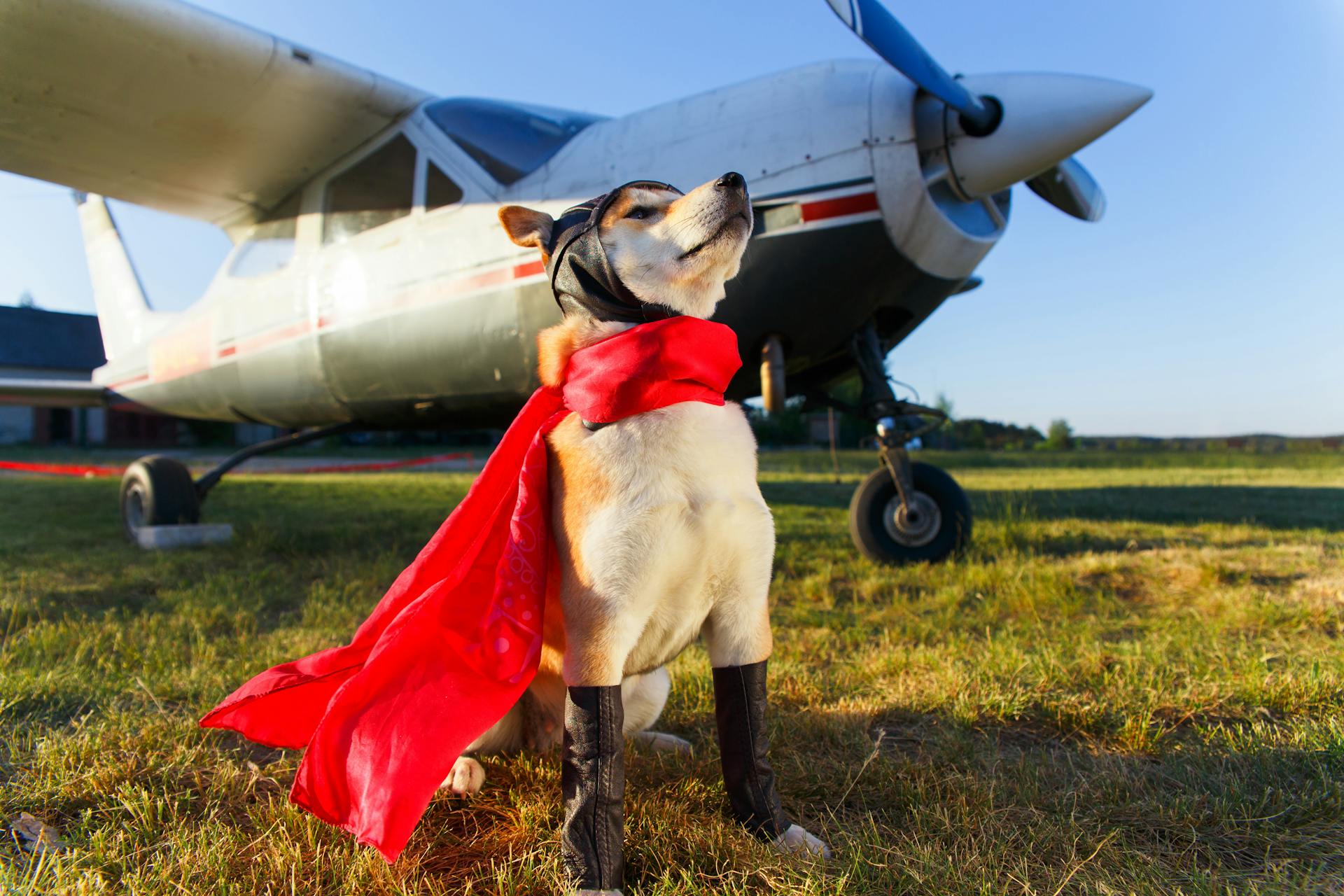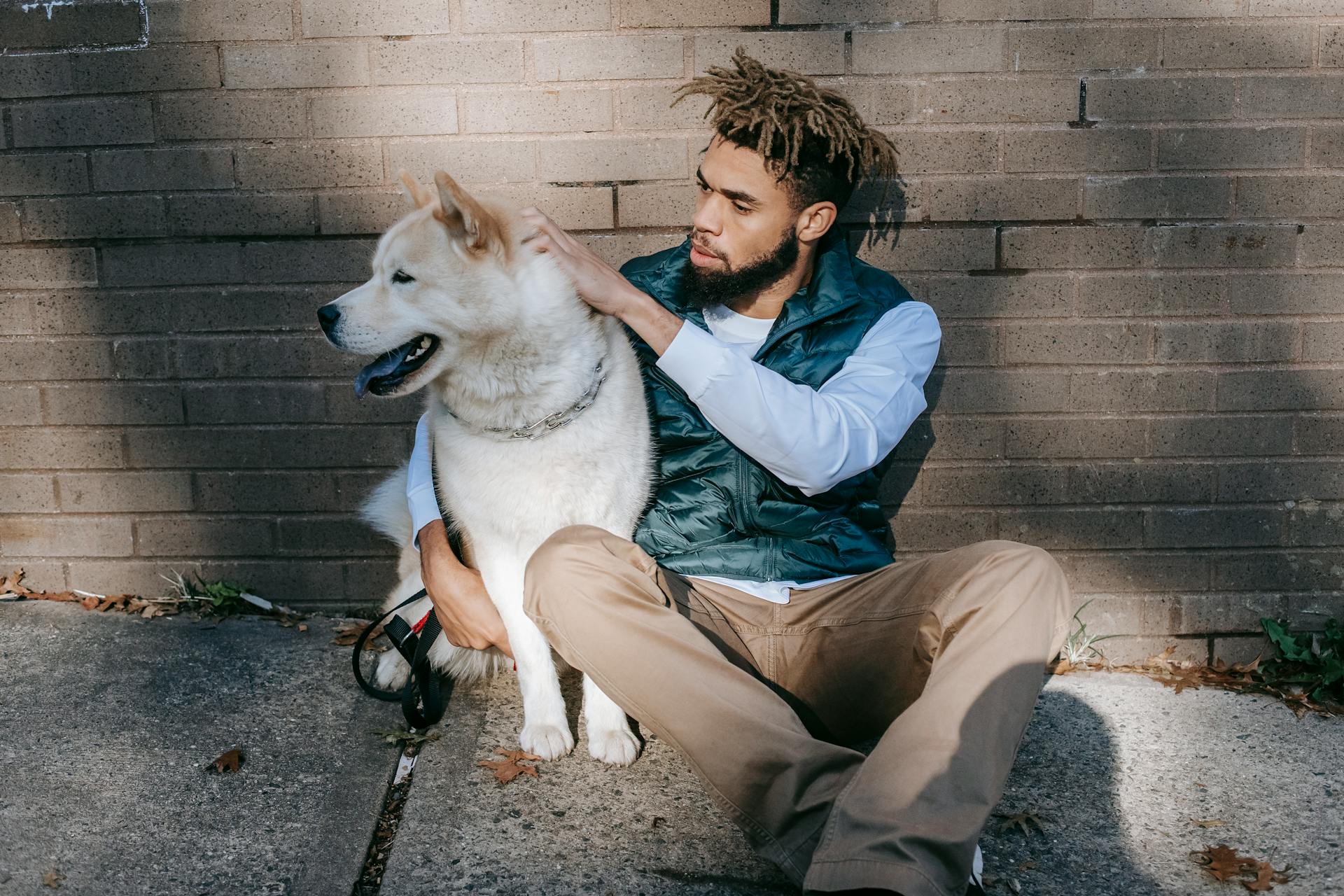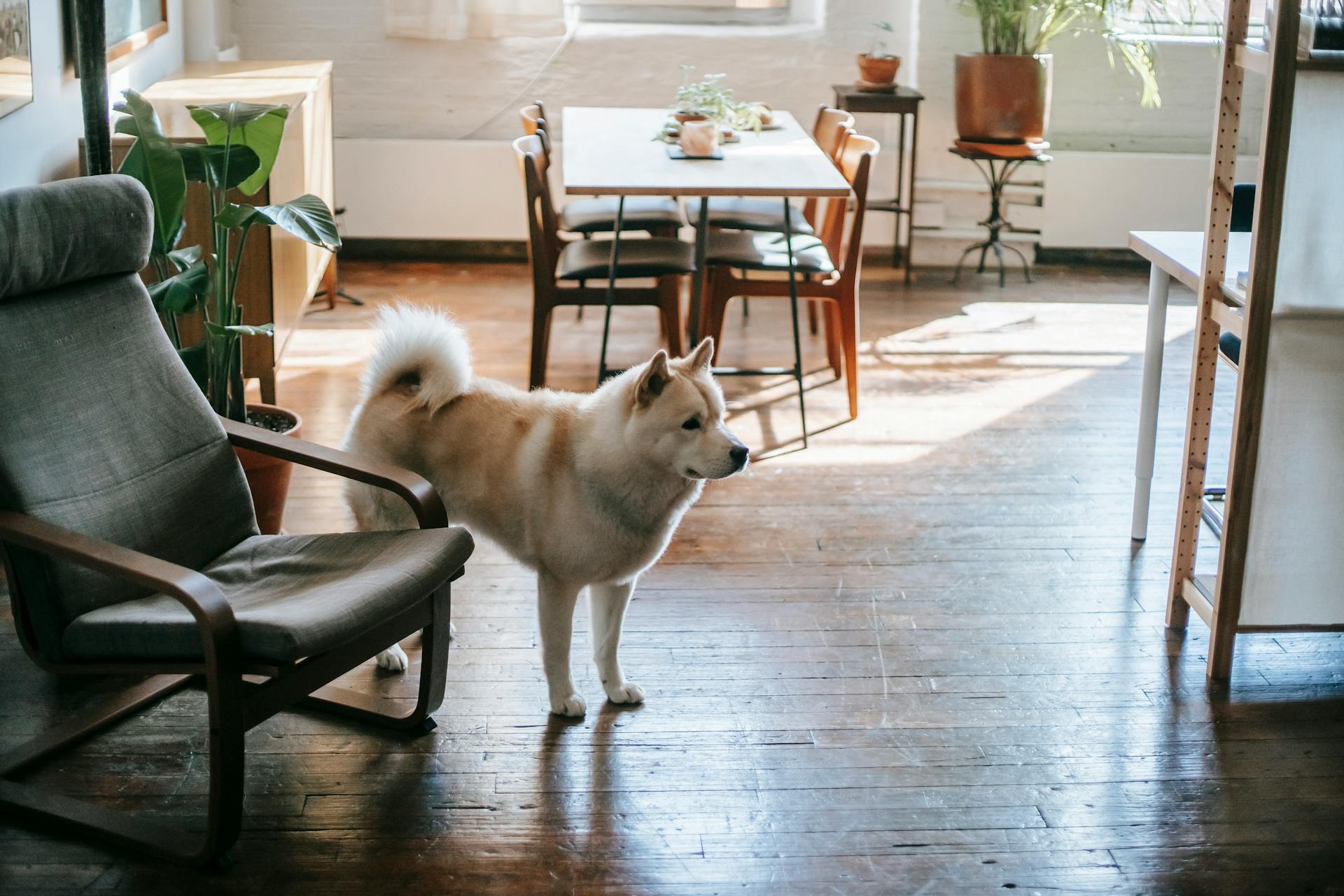
The majestic Akita, a breed steeped in history and tradition in Japan. The Akita's origins can be traced back to the Matagi, a group of skilled hunters in northern Japan, who bred them for their strength and endurance.
Akitas were highly valued for their hunting prowess, particularly for their ability to track and retrieve large game such as deer and bear. The breed's strong prey drive and keen sense of smell made them ideal for this purpose.
In the 19th century, the Akita was recognized as a distinct breed by the Japanese government, and its popularity grew as a companion animal among the nobility.
Explore further: Japanese Akita Inu Temperament
Physical Characteristics
Akitas in Japan are known for their striking physical characteristics.
The average weight of an Akita is about 110 pounds for males and about 80 pounds for females. Their bodies are muscular and slightly longer than they’re tall, with straight and strong legs.
Akitas have broad chests and necks, as well as large heads with short muzzles, small eyes, and erect ears. The tail is full and curled over the body.
The Akita's coat is short to medium in length and quite dense, with a thick and soft undercoat that makes them well suited to colder climates. They come in a variety of colors, including black, fawn, white, red, brown, and brindle.
Here are the different colors of Akitas:
- Black
- Fawn
- White
- Red
- Brown
- Brown Brindle
- Red Brindle
- Fawn Brindle
- Black, Brown Undercoat
- Black, Silver Undercoat
- Black, Red Undercoat
- Black, Fawn Undercoat
- Brown, Black Overlay
- Fawn, Black Overlay
- Red, Black Overlay
- Silver, Black Overlay
- White, Red Shading
- Silver
- Black Brindle
- Silver Brindle
The height of an American Akita ranges from 24–28 inches at the shoulder, and the breed can weigh between 70–130 pounds.
Temperament and Personality
Akitas in Japan are known for their reserved temperament, which can make them great watchdogs due to their distrust and hostility towards strangers. They are also very affectionate and loyal to their owners.
Akitas can get along well with familiar children, especially if trained early and consistently, but they tend to be aloof towards strangers. They can get jealous if you give too much love to another dog, so it's best to make them your only fur child.
These dogs are not always the best choice for families with small children because they can be quite possessive of their toys or food and are generally not open to playing. With proper training and early socialization, Akitas can learn to behave around kids and make excellent family pets.
Akitas are large, powerful, and headstrong dogs, which makes them a significant responsibility to own. They were never bred to work or live in groups, so they're usually happiest to live as a single household pet.
With proper socialization, Akitas can learn to tolerate other animals, but they may be aggressive toward other dogs, especially those of the same sex. This is why it's essential to introduce them to other pets in puppyhood to avoid any potential conflicts.
Akitas have a general distrust of strangers, which can make them wary of new people and environments. However, with patience and consistent training, they can become confident and calm in new situations.
Care and Maintenance
Akitas are known for being relatively odorless, but they still need regular grooming to stay clean.
Brushing their thick coat a few times a week is a good rule of thumb, but be prepared for some intense shedding during seasonal changes.
Regular nail trimming and teeth brushing are crucial for an Akita's health, and should be done frequently.
Akitas require moderate exercise, and a daily jog or long walk is a great way to keep them happy and healthy.
If your Akita is spending too much time lounging around the house, they can quickly gain weight, so make sure to keep them active.
Akitas are easy to potty train, but consistent training from an early age is key to developing good habits.
They have higher energy levels, so a large, fenced-in yard is a must to keep them entertained and exercised.
Akitas shed minimally throughout the year, but during seasonal changes, they "blow-coat" and leave a trail of hair everywhere.
Brushing their teeth daily is essential for maintaining their oral hygiene, and should be done regularly.
Their nails should also be trimmed regularly to prevent overgrowth, and to keep them comfortable.
Health and Nutrition
Akitas in Japan are known for their robust health, but like all breeds, they're not immune to certain health issues.
A fresh viewpoint: Akita Dog Health Problems
Their lifespan is relatively long, ranging from 10 to 13 years, making them a wonderful companion for many families.
However, Akitas are prone to hip dysplasia, a condition that can cause arthritis and mobility problems.
Gastric dilatation-volvulus (GDV), also known as bloat, is another serious issue that can be life-threatening if not treated promptly.
This is why it's crucial to consider a surgery called gastropexy, which can prevent the stomach from twisting and cutting off blood supply.
A reputable breeder can also play a significant role in reducing the risk of health problems.
Here are some common health issues Akitas may face:
- Hip dysplasia
- Hypothyroidism
- Eye problems
- Cataracts
- Dental problems
- Obesity
History and Origin
The Akita's history is deeply rooted in Japan, with evidence of its existence dating back to the Jōmon Period, around 14,000-300 B.C. This ancient breed was initially bred as a strong, hard-working hunting dog.
The Akita's origins can be traced back to the 17th century in the Akita prefecture, where it was highly valued for its loyalty. In fact, the breed was named after this region.
In Japan, the Akita is considered a symbol of good health and is one of seven dog breeds designated as a natural national monument. This designation was made official in 1931.
Recommended read: Shiba Inu Price Japan
Hachiko's Legend
Hachiko, a loyal Akita-inu, is a classic example of the breed's faithfulness. He waited for his owner at Shibuya Station every day for almost a decade after his owner's death.
The legend of Hachiko began with a newspaper story that moved the nation. This story has been retold in countless films and television dramas about the loyal companion.
A statue of Hachiko in Shibuya is a popular spot to meet and take photographs. The original statue was requisitioned for war materiel in World War II, making this the second incarnation.
Hachiko's story has been transplanted to the United States in a successful 2009 film, Hachi: A Dog's Tale, starring Richard Gere. This adaptation raised the profile of the Akita-inu around the world.
The Akita-inu's loyalty and faithfulness are traits that have made them popular as both pets and guard dogs.
For your interest: Akita Dog Statue
Origin & History
The Akita's rich history dates back to the 17th century in the Akita prefecture in Japan.

The breed has a long history, with evidence of its existence dating back to the Jōmon Period (14,000–300 B.C.). This ancient period predates the breed's use as a hunting dog, which began in the 1600s.
The Akita was originally bred for hunting and guarding Japanese royalty, earning it a special place in the country's culture. In 1931, the Japanese government declared the breed a Natural Monument.
The breed's spiritual significance is deeply rooted in Japanese culture, where it's seen as a symbol of good health. This is why the Akita remains a beloved and revered breed in Japan.
The Akita first made its way to the U.S. in 1937, when Helen Keller brought a pup named Kami home after a tour through Japan. This marked the beginning of the breed's popularity in the Western world.
After World War II, American soldiers brought Akita dogs back to the U.S., further popularizing the breed. The breed was officially recognized by the American Kennel Club in 1972.
Broaden your view: Big Shiba Inu Breed
Fun Facts and Trivia
In Japan, the Akita is revered to such an extent that the family of a newborn child is often presented with a statue of an Akita, symbolizing health, happiness, and long life. This tradition highlights the deep respect the Japanese have for this breed.
You can meet Akita dogs in the Akita prefecture of Japan at various businesses, including the Akita Dog Museum, the Akita Dog Visitor Center, the Ani Ski Resort, Furusawa Hot Springs, and the Royal Hotel Odate. These establishments offer a unique opportunity to interact with these magnificent dogs.
Some famous Akita pet parents include Henry Cavill and his American Akita named Kal, as well as Sarah Michelle Gellar and Freddie Prinze Jr. with their adorable Akita Inus Kumi and Sato.
Check this out: Japan Kennel Club
Fun Facts
In Japan, the Akita is a breed so revered that families of newborn children are often presented with a statue of one, symbolizing health, happiness, and long life.

The Akita prefecture in Japan is a great place to visit if you're an Akita fan - you can meet these amazing dogs at the Akita Dog Museum, the Akita Dog Visitor Center, the Ani Ski Resort, Furusawa Hot Springs, and the Royal Hotel Odate.
Helen Keller fell in love with the Akita breed after reading about the famous Hachiko, who waited nearly 10 years at a train station for his owner's return, unaware the owner had passed away.
Some well-known Akita owners include Henry Cavill and his American Akita Kal, and celebrity couple Sarah Michelle Gellar and Freddie Prinze Jr., who have their adorable Akita Inus Kumi and Sato.
Here are some notable Akita owners:
- Henry Cavill and his American Akita Kal
- Sarah Michelle Gellar and Freddie Prinze Jr. with their Akita Inus Kumi and Sato
Three Little-Known Facts
Did you know that the shortest war in history was between Britain and Zanzibar on August 27, 1896, and lasted only 38 minutes? Zanzibar surrendered after just 12 minutes of fighting, and the remaining 26 minutes were spent on ceasefire negotiations.
The longest word in the English language, according to the Oxford English Dictionary, is pneumonoultramicroscopicsilicovolcanoconiosis, a lung disease caused by inhaling very fine particles of silica.
Frequently Asked Questions
Which part of Japan is Akita?
Akita is located in the northern Tōhoku region of Honshū, Japan's main island. It's situated on the Sea of Japan coast.
Featured Images: pexels.com


